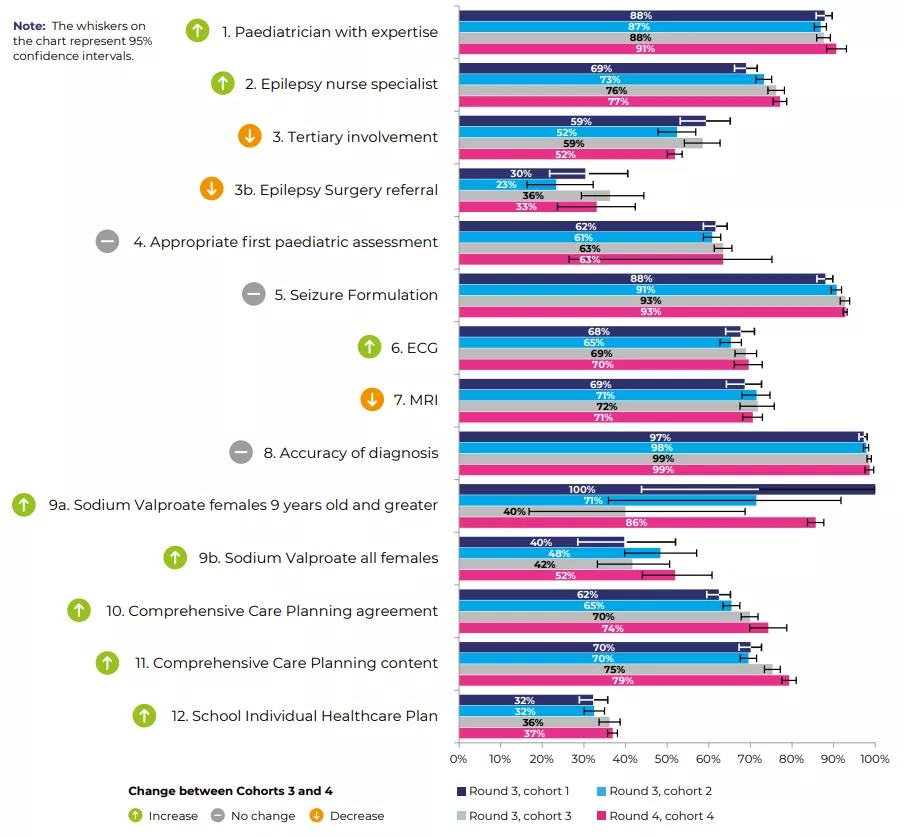Read our summary here, or download the full report and appendices at the bottom of this page.
- Background to Epilepsy12 audit
-
Epilepsy12 was established in 2009 and has the continued aim of helping epilepsy services, and those who commission health services, to measure and improve the quality of care for children and young people with seizures and epilepsies. In 2022, a further contract was awarded to RCPCH to deliver the audit up to 31 March 2025.
The audit is commissioned by the Healthcare Quality Improvement Partnership (HQIP) as part of the National Clinical Audit and Patient Outcomes Programme (NCAPOP) and is delivered by the Royal College of Paediatrics and Child Health (RCPCH).
Front cover art
Our report's cover features the painting, Flower Garden, by Janet Lee from Malaysia, an international artist and colourist who is living with epilepsy.
It's an explosion of vibrant colours that declares being “perfectly imperfect” is far from boring. Janet’s artwork embodies the spirit of resilience, where she empowers and enlightens others, reminding us that beauty and joy can be found in the most unexpected places.
You can read Janet's story - see downloads.
Executive summary
Epilepsy12 is the national clinical audit of seizures and epilepsies in children and young people for England and Wales. There are three main elements to Epilepsy12 which are included in the annual report:
- Auditing of the clinical care provided to children and young people newly diagnosed with epilepsy in 'cohort 4', and the organisation and structure of epilepsy services as at November 2022.
- Quality improvement activities and projects related to the audit., including the Epilepsy Quality Improvement Programme, a RCPCH Quality Improvement collaborative for paediatric epilepsy teams.
- The Epilepsy12 Youth Advocates programme, RCPCH&Us - a group of epilepsy experienced or interested children, young people and families volunteering to improve epilepsy care.
Results for the twelve performance indicator measures across cohorts 1-4 are shown below.

Key messages
Read the four key messages described in the annual report below.




Quality improvement case studies
Epilepsy12 invited paediatric epilepsy services in England and Wales to provide case studies of their quality improvement (QI) activities undertaken in the last year to improve the care provided to children and young people with epilepsies.
Results by Health Board / Trust and regional network
Our detailed results spreadsheets cover the Round 4 clinical audit data for cohort 4 and the 2022 organisational audit results. You can download the MS Excel spreadsheets below.
In the first tab, 'Information', you can see the 10 topics covered in each audit. You can filter each worksheet to view and compare data for one or more NHS Health Boards/Trusts, or Regional Paediatric Epilepsy Networks, or you can view for all units in England and Wales.
The audit measures that relate to the national report's key findings are highlighted in blue columns.
Specific Health Board / Trust level reports have been shared with the Epilepsy12 Designated leads by email.
Clinic posters
We have created one-page posters providing Trust-level summaries of Epilepsy12 results from the national combined report. They display how individual NHS Trusts and Health Boards performed on eight Epilepsy12 indicators, compared to national averages.
Find the latest clinic posters here.
Acknowledgements
The Epilepsy12 project team would like to thank the administrators, clinical audit department staff, data analysts, doctors, nurses and others within participating Health Boards and Trusts. We would also like to thank our stakeholders and colleagues within the Royal College of Paediatrics and Child Health, who provide invaluable input into the design and delivery of the audit.
Download a full list of our acknowledgements below.
Contact
The Epilepsy12 project team members are available to respond to any related queries at epilepsy12@rcpch.ac.uk or on 0207 092 6157.










